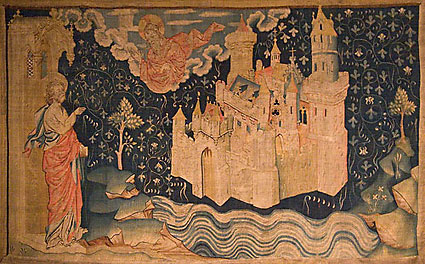Apr
8
2009
 “It is most remarkable that not only in Revelation do we find large patterns of evidences befitting the AD 60s era, but also even many smaller details. It it surely no accidental similarity that allows us to find not only particular personages (Nero), cultural structures (the Jewish Temple), and historical events (the Neronic persecution and the Jewish War) that harmonise well with the Neronic era, but even time-frames for these that fill out the picture of the era of which John wrote. It can be no other than in the mid- to late AD 60s.”
“It is most remarkable that not only in Revelation do we find large patterns of evidences befitting the AD 60s era, but also even many smaller details. It it surely no accidental similarity that allows us to find not only particular personages (Nero), cultural structures (the Jewish Temple), and historical events (the Neronic persecution and the Jewish War) that harmonise well with the Neronic era, but even time-frames for these that fill out the picture of the era of which John wrote. It can be no other than in the mid- to late AD 60s.”
Kenneth Gentry, Before Jerusalem Fell, p. 255-256
Comments Off | tags: Apocalyptic, Jewish war, Kenneth Gentry, Nero, Revelation, Temple | posted in Quotes, The Last Days
Apr
8
2009

The Restoration Era is the least understood period of Bible history. But without understanding the foundations laid during this time, we misinterpret the ‘apocalyptic’ passages in the New Testament. We won’t understand John’s new Jerusalem if we think Nehemiah’s is just about restoring a broken community.
Comments Off | tags: Apocalyptic, Nehemiah | posted in The Restoration Era
Apr
8
2009
“…when one is confronted with the language of Revelation it is no mere difference of style which makes one gasp, but crudities, grammatical errors and a quite extraordinary juxtaposition of words. So wholly different is the book in its word-usage and composition from the Fourth Gospel that many scholars find themselves unable to believe that both could be written by the same person. The Fourth Gospel is written, within its limited vocabulary, smoothly and correctly and would probably have caused no literary qualms in a contemporary Greek reader. But Revelation piles word upon word remorselessly, mixes cases and tenses without apparent scruple, and shows at times a complete disregard for normal syntax and grammar… Continue reading
Comments Off | tags: Apocalyptic, John, Revelation | posted in The Last Days
“It is most remarkable that not only in Revelation do we find large patterns of evidences befitting the AD 60s era, but also even many smaller details. It it surely no accidental similarity that allows us to find not only particular personages (Nero), cultural structures (the Jewish Temple), and historical events (the Neronic persecution and the Jewish War) that harmonise well with the Neronic era, but even time-frames for these that fill out the picture of the era of which John wrote. It can be no other than in the mid- to late AD 60s.”


























